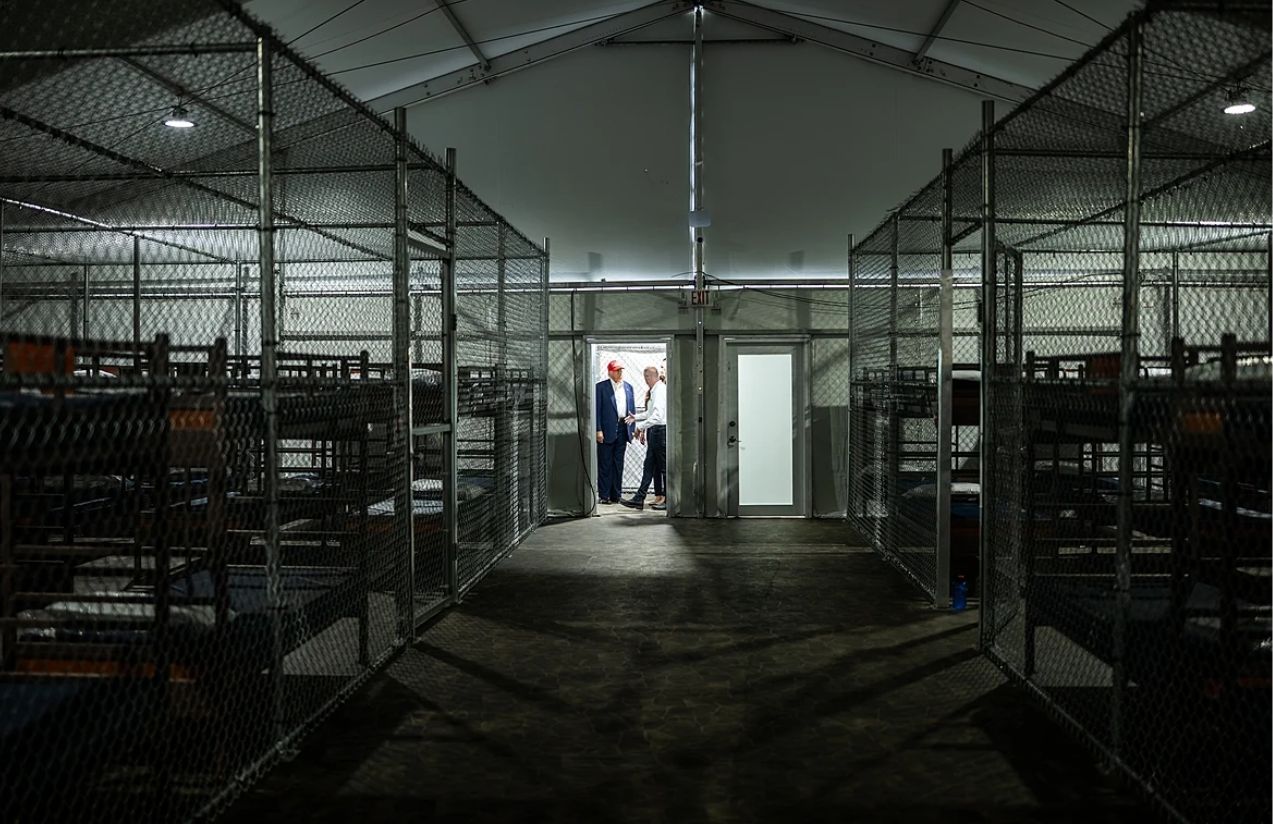The newly opened immigrant detention center known as “Alligator Alcatraz,” located deep in Florida’s Everglades, has launched amid a storm of controversy. In its first weeks of operation, the facility has faced serious allegations of poor conditions, lack of access for local authorities, and a general climate of secrecy.
The center officially began operations on July 2 following a visit of endorsement by President Donald Trump. Built in less than two weeks by the state government, the facility was set up at a former airstrip in a protected ecological reserve west of Miami. It features large canvas tents with bunk beds, wire mesh cells, portable toilets, and power generators. The hasty construction sparked protests from environmental groups and Indigenous communities, who criticized both the environmental impact and the absence of public consultation.
Tensions grew as state officials refused entry to local authorities and media, drawing criticism over the lack of transparency and legal safeguards.
One of the first detainees, a 38-year-old Mexican man who has lived in the U.S. for two decades, was transferred to the center on July 3 after being arrested for driving without a license on his way to a construction job. According to his wife, conditions inside the camp are dire: there are no showers, meals consist only of “sandwiches with a tiny piece of ham,” and power outages are frequent. “If someone needs to go to the infirmary, they’re shackled hand and foot. It’s abusive,” she said.
In a recorded phone call from the center, the man can be heard saying, “If something happens to me, you have all my information—sue them, because this place is useless, completely useless.”
This testimony adds to a growing number of reports about the facility’s conditions, including claims that one detainee was hospitalized. The Department of Homeland Security (DHS) denied those claims, labeling them as “fake news,” and accused a reporter on social media of spreading “conspiracy theories” about the alleged mistreatment of “illegal aliens convicted of rape, murder, and sexual crimes against minors.”
The DHS insisted the center adheres to “higher standards than most U.S. prisons” and that detainees are provided with proper medical care, nutrition, and opportunities to contact attorneys and family members.
Miami-Dade County, which owns the land where the center was built, was excluded from the state’s planning process. The facility’s installation was justified under emergency powers granted to Governor Ron DeSantis. Concerned by the lack of oversight, county mayor Daniella Levine Cava sent a formal letter to Florida’s attorney general requesting immediate access to the site. “I’m deeply concerned about the alarming number of deaths and medical emergencies in immigrant detention centers in Florida and across the country,” she wrote.
At least five people have died in immigration custody in Florida so far this year—a sharp rise compared to previous years. Advocacy groups have also reported overcrowding and inhumane conditions in similar facilities.
Democratic state lawmakers who attempted to visit Alligator Alcatraz last week were denied entry by state officials citing “security concerns.” However, Florida’s government announced this week that it would host an official tour of the facility for state legislators and members of Congress this coming Saturday.
A spokesperson for U.S. Immigration and Customs Enforcement (ICE) clarified to El País that the facility is not run by ICE. Instead, it is managed by the State of Florida through its Division of Emergency Management and staffed by members of the National Guard trained under the 287(g) program, which authorizes state agents to perform immigration enforcement duties.
“Under President Trump’s leadership, we are moving quickly on innovative and cost-effective ways to fulfill the American people’s mandate for mass deportations of illegal immigrants with criminal records,” the statement said.
Meanwhile, the wife of the detained man from Tampa voiced her distress. “No one, no matter what they’ve done, deserves to be treated this way,” she said. “If they’re going to deport them, then do it—but not like this. We came here to work, not to be treated like animals. Now even animals have more rights than we do.”

